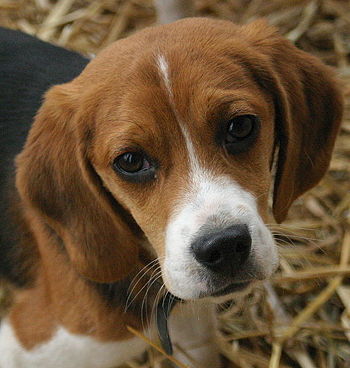Puppy: Difference between revisions
imported>Aleta Curry (expand) |
mNo edit summary |
||
| (3 intermediate revisions by one other user not shown) | |||
| Line 2: | Line 2: | ||
{{Image|Beagle puppy portrait.jpg|right|350px|Puppy.}} | {{Image|Beagle puppy portrait.jpg|right|350px|Puppy.}} | ||
A '''puppy''' (plural ''puppies'') is an [[youth|immature]] [[dog]]. The shortened form ''pup'' is also used, although the word "pup" is also used for the young of many other animals and in such context is not slang. The word ''whelp'', taken from the verb ''to whelp'', to give birth to a pup, is also heard, especially for a newborn pup. By extension, pup, puppy and whelp are sometimes applied affectionately or derogatorily toward young, rascally humans. Puppies are formally called ''puppy dog'' (males) and ''puppy bitch'' (female). These are [[dog breeding|breeders | A '''puppy''' (plural ''puppies'') is an [[youth|immature]] [[dog]]. The shortened form ''pup'' is also used, although the word "pup" is also used for the young of many other animals and in such context is not slang. The word ''whelp'', taken from the verb ''to whelp'', to give birth to a pup, is also heard, especially for a newborn pup. By extension, ''pup'', ''puppy'' and ''whelp'' are sometimes applied affectionately or derogatorily toward young, rascally humans. Puppies are formally called ''puppy dog'' (males) and ''puppy bitch'' (female). These are [[dog breeding|breeders']] and [[animal fancy|fanciers']] terms and the distinction is not generally made in everyday speech; the words "puppy" and "puppy dog" are applied indiscriminately to all young dogs. | ||
== Puppy characteristics == | |||
Like the young of many animals, puppies' appearance can be markedly different to that of adult dogs. There are a variety of [[dog breed]]s with varying attributes, but some shared characteristics among the young of all dog breeds are softly folded ears, pink paw pads, they may have pink or pink-tipped noses, and they generally have large paws that they have to "grow into". Puppies may be born singly, but generally they are [[birth|born]] in a group containing three to eight, called a ''litter''. | |||
== Puppy play == | |||
Puppies like to [[play]], but this is not all fun and games. Growling, snapping, biting, stalking and sexual behaviour are all taught or actively encouraged by the pups' ''dam'', their mother. This is an important part of puppy learning. | |||
==References== | ==References== | ||
{{reflist}} | {{reflist}}[[Category:Suggestion Bot Tag]] | ||
Latest revision as of 16:00, 8 October 2024
A puppy (plural puppies) is an immature dog. The shortened form pup is also used, although the word "pup" is also used for the young of many other animals and in such context is not slang. The word whelp, taken from the verb to whelp, to give birth to a pup, is also heard, especially for a newborn pup. By extension, pup, puppy and whelp are sometimes applied affectionately or derogatorily toward young, rascally humans. Puppies are formally called puppy dog (males) and puppy bitch (female). These are breeders' and fanciers' terms and the distinction is not generally made in everyday speech; the words "puppy" and "puppy dog" are applied indiscriminately to all young dogs.
Puppy characteristics
Like the young of many animals, puppies' appearance can be markedly different to that of adult dogs. There are a variety of dog breeds with varying attributes, but some shared characteristics among the young of all dog breeds are softly folded ears, pink paw pads, they may have pink or pink-tipped noses, and they generally have large paws that they have to "grow into". Puppies may be born singly, but generally they are born in a group containing three to eight, called a litter.
Puppy play
Puppies like to play, but this is not all fun and games. Growling, snapping, biting, stalking and sexual behaviour are all taught or actively encouraged by the pups' dam, their mother. This is an important part of puppy learning.
